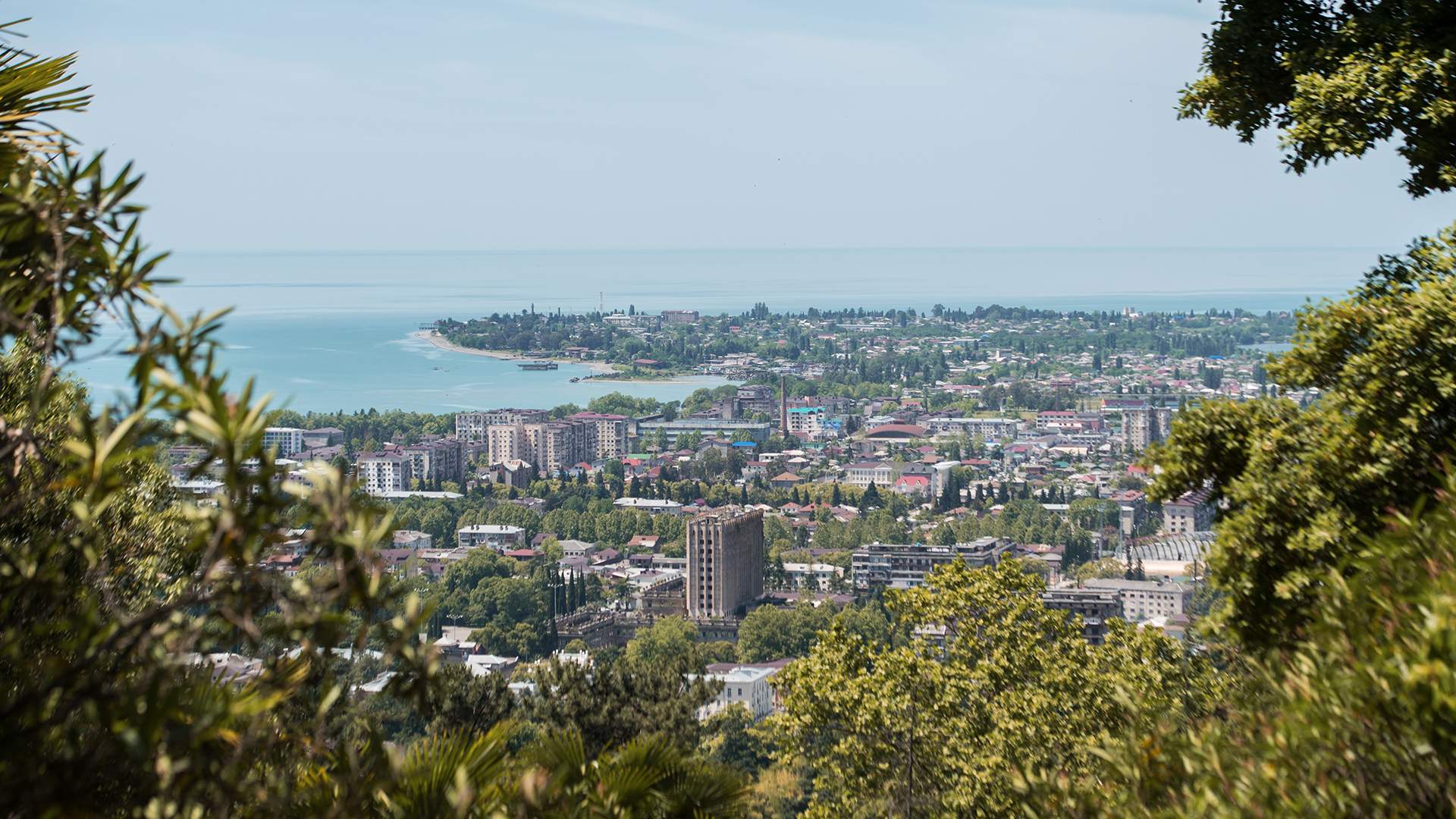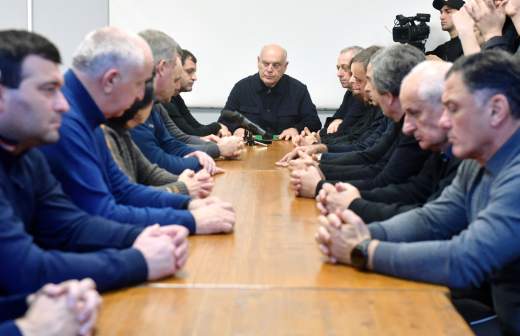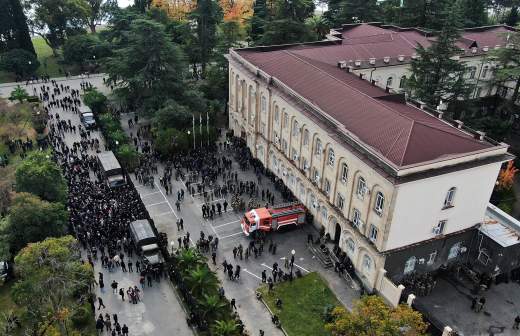Apsny for real: Abkhazia plunges into economic crisis

The socio-economic situation in Abkhazia has sharply deteriorated in recent days. The authorities stopped paying salaries to state employees, there were disruptions in the export of mandarins, new schedules of blackouts were introduced on December 9, and schools and kindergartens have been closed since December 10. According to experts, the resolution of the crisis should not wait until spring. Details - in the material "Izvestia".
Taken at gunpoint
In early December, the socio-economic situation in Abkhazia (self-name - Apsny) worsened. First, the acting Finance Minister Vladimir Delba reported that budgetary employees in the republic stopped receiving salaries and other payments. "Nothing is paid at all. First of all, I pay attention to the power block, law enforcement agencies, which are also left without funding," he emphasized during the meeting. The Minister added that he sees no prospects for improvement of the situation.
The second important point is the difficulties with the export of the main export commodity - mandarins. On December 6, Deputy Prime Minister Valery Bganba said that the Russian side had discovered "some kind of harmful fly" in citrus fruits, and in this regard, loaded trucks are queuing at the border near the Psou River.
Later Rosselkhoznadzor denied the information about the import ban, and Abkhazian Agriculture Minister Beslan Dzhopua said that the pest was found only in some batches of mandarins. According to the official, there is no question of a ban, although phytosanitary control has become more thorough. Abkhazian social networks note that tangerines are one of the symbols of the New Year, in December the demand for them is especially high, so producers are particularly vulnerable now.
Finally, the third difficulty was the shortage of electricity. Since December 9, new schedules of blackouts have been introduced in the republic, electricity is now cut off daily for six hours instead of four. At the same time, there are no scheduled blackouts at night, but during the day electricity is supplied only twice for 2 hours and 20 minutes. Abkhazian officials explain that the republic lacks its own capacity - the Inguri hydroelectric power plant has a critically low water level.
In this regard, the situation is already difficult. Thus, hospitals complain of difficulties with operation of X-ray machines, ultrasound machines and other equipment. And since December 10, schools and kindergartens will be closed due to energy shortages.
At the same time, aggravation of the crisis is quite possible, as acting Prime Minister Bganba said that now Abkhazia has paid for the overflow from Russia only until December 10. "Further on, the situation will depend on whether we can find funds to pay for further overflow. With minimal output of Ingur HPP we will not be able to provide the country with electricity," Bganba explained. He emphasized that he had asked the Russian government for help.
Sukhum
Relations between Russia and Abkhazia have been deteriorating throughout the year. The scenario of each round was approximately the same: Moscow offered one or another form of integration, and Sukhum was evading it under various pretexts, while local politicians spoke about their desire to defend the sovereignty of the republic.
Thus, in February an agreement on cooperation between the Interior Ministry of Abkhazia and the Rosgvardia was on the agenda. The document provided for exchange of experience between the agencies, training of Abkhazian security forces in Russian training centers, joint exercises and trainings, exchange of legislative acts. The Abkhazian opposition suspected that after the signing of the document the Rosgvardia would be "directly involved in the internal affairs of the republic.
After a heated discussion, Sukhum refused ratification. "We share the concerns of citizens, as Minister of Internal Affairs I responsibly declare that in our department, as well as in the entire leadership of the country, there are no people ready to act to the detriment of national interests. Our legislation does not allow for public security and order in the country to be ensured by law enforcement agencies of a foreign state," - said then head of the Interior Ministry Robert Kiut.
Further in July, the President of Abkhazia introduced the so-called law on apartments to the parliament. The document allowed foreigners to build and take ownership of real estate objects, it was prescribed that in the next ten years 30 thousand apartments and houses will be built in the eastern regions of the republic. The authorities said that this would boost the local economy and help fill the budget.
In turn, the opposition said the law would upset the demographic balance. "We will bring in at least 60,000 people who are ready to buy apartments for a lot of money," emphasized Aidgylara party leader Can Kvarchia. As a result, after several protest rallies, the parliament refused to consider the bill.
Finally, this fall an agreement on investments was on the agenda. The document envisioned that large Russian business, which would be willing to invest at least 2 billion rubles in a project, would receive a number of serious preferences. In particular, entrepreneurs will be exempt from customs duties, property and profit taxes for eight years. In addition, VAT will be paid at a preferential rate of 5%, and they will also receive quotas for the importation of foreign workers.
In late October, Russian Economic Development Minister Maxim Reshetnikov and Abkhazian Deputy Prime Minister Kristina Ozgan signed an agreement, and the document was scheduled to be discussed in parliament on November 15. However, riots broke out in Sukhum, representatives of the opposition occupied the government quarter, and President Aslan Bzhania went to his ancestral village and later agreed to leave his post. As a result, after the change of power - on December 3rd - Abkhazian MPs voted against ratification of the agreement.
After that, the Abkhazian government reported that Russia had almost completely stopped providing any financial assistance. According to Finance Minister Vladimir Delba, the republic's budget will not receive 1.8 billion rubles by the end of the year. A number of Russian politicians emphasize that further cooling of relations is possible. For example, deputy chairman of the State Duma committee on CIS affairs Konstantin Zatulin said that it was "time to cure Abkhazia of the parasitism that has developed there."
"The republic was simply adrift."
Abkhazian political scientist Inal Khashig believes that the current crisis will last at least until the end of winter.
- Early presidential elections are scheduled for February 15. I think that only after the vote the dialog with Moscow will revive and search for some mutually acceptable options will begin. I hope that we will see some compromise solutions. Perhaps, the Russian side will soften the requirements, after all, the current investment agreement was frankly one-sided," he says.
The interlocutor adds that the crisis may become an impetus for the development of Abkhazia.
- In recent years we have changed presidents, but the course remained the same. The republic was just going with the flow, no one was engaged in development. The authorities were relying solely on Russia, although it is not obliged to feed us all the time. Perhaps now officials will realize that they need to change a lot of things in the management system, somehow revitalize the domestic economy, and work on self-sufficiency," he says.
Vadim Mukhanov, head of the Caucasus sector of IMEMO RAS, believes that substantive dialog between Russia and Abkhazia will begin in spring or even summer.
- Now there is a power vacuum in the republic, there are no clear leaders, there are no people with whom it is possible to come to an agreement. Accordingly, first presidential elections will be held, then a new leader will gather a team and get up to speed, and then, apparently, negotiations will begin. At the same time, relations in any case need resetting, more than 200 different documents have been signed between Moscow and Sukhum, more than half of them do not work," he emphasizes.
Переведено сервисом «Яндекс Переводчик»







